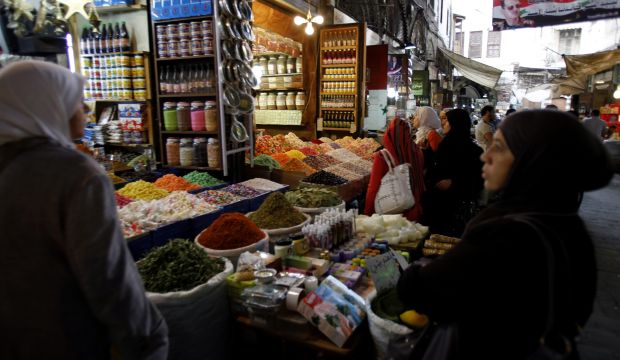Damascus, Asharq Al-Awsat—The famous Al-Buzuriyah souq, a traditional market specializing in herbal remedies in the Old City of Damascus, was for decades a destination for dervishes and the poor who sought cheap treatments for their ailments. Today, as Syria’s war and economic crisis grinds on, causing the price of imported and locally-manufactured drugs to rocket, ordinary Syrians are returning to traditional preparations to save on medical costs.
Several of the major Syrian pharmaceutical companies are located in battle zones; many of the factories have been completely destroyed and those that still stand have been forced to suspend operations due to failing finances and the logistical nightmare of distributing drugs. Syrian pharmacist Mazin said: “In the past, there used to be a reliance on locally-manufactured drugs produced in Aleppo, Syria’s economic capital, and in Rif Dimashq governorate, but some of the factories such as Amrit, Asia and Barakat sit idle as a result of the clashes.” As a result, Mazin explained that the cost of medicine made in Syria has increased by 25-50 percent.
The price of imported drugs has increased in line with the value of the US dollar to the Syrian pound: before the war the US dollar was worth 50 Syrian pounds compared to 190 Syrian pounds today. Mazin says that there is little imported medicine available, making up only 10 percent of the drugs in pharmacies.
Bassam Mardini, who was browsing Al-Buzuriyah souq, said: “Some people search the Internet for herbal medication for a certain disease they suffer from because they want to avoid seeing the doctor to save on check-up fees.”
The herb market has also changed after shop owners raised their prices due to the cost and difficulty involved in collecting the herbs in the countryside—but they are still cheaper than the chemical drugs sold in pharmacies.
Ahmed Sowailam, one of the herb vendors, says that Syria’s environment supports a rich variety of herbs, including nearly 3,700 different kinds grown in the desert, coastal mountains and valleys. They include wormwood, capers, thyme, ammi visnaga, oregano, rosemary, hawthorn, sage, mint, stone parsley, zallouh root, chamomile and hyssop.
Sowailam says that even before the uprising Syrians used herbs to treat various illnesses because they trusted herbal treatments more than chemical medication because they cause fewer side effects—doctors would often prescribe herbs rather than modern medicine.
Roba Sa’ed, a private-sector employee in Damascus, was searching the stalls for weight loss herbs. “These herbal remedies, which we find on the Internet or on medical or satellite TV channels, save us a visit to the doctor’s clinic or fees that range between 1,000-2,000 Syrian pounds (5-10 US dollars) compared to 500-1000 pounds before the uprising.”

